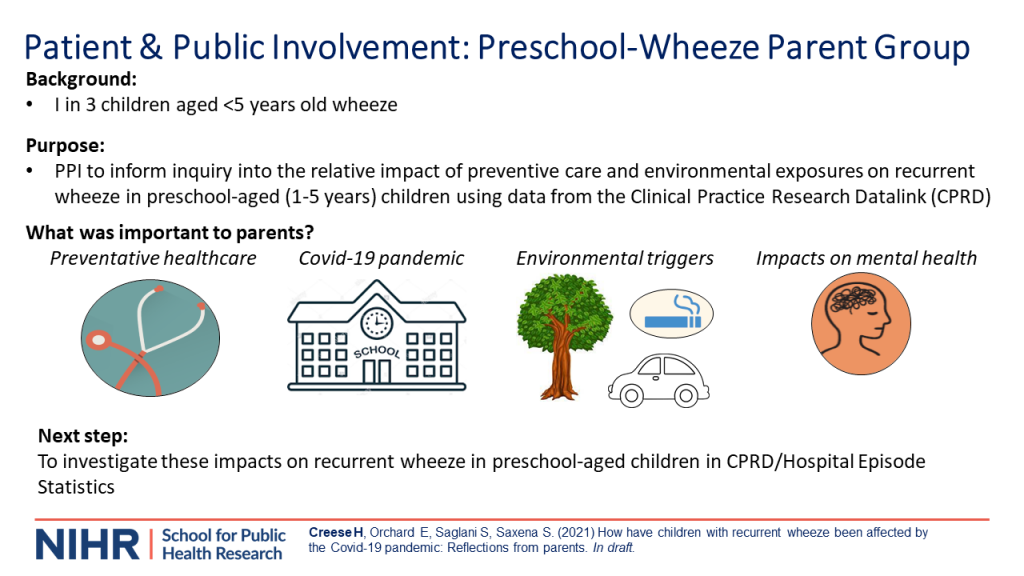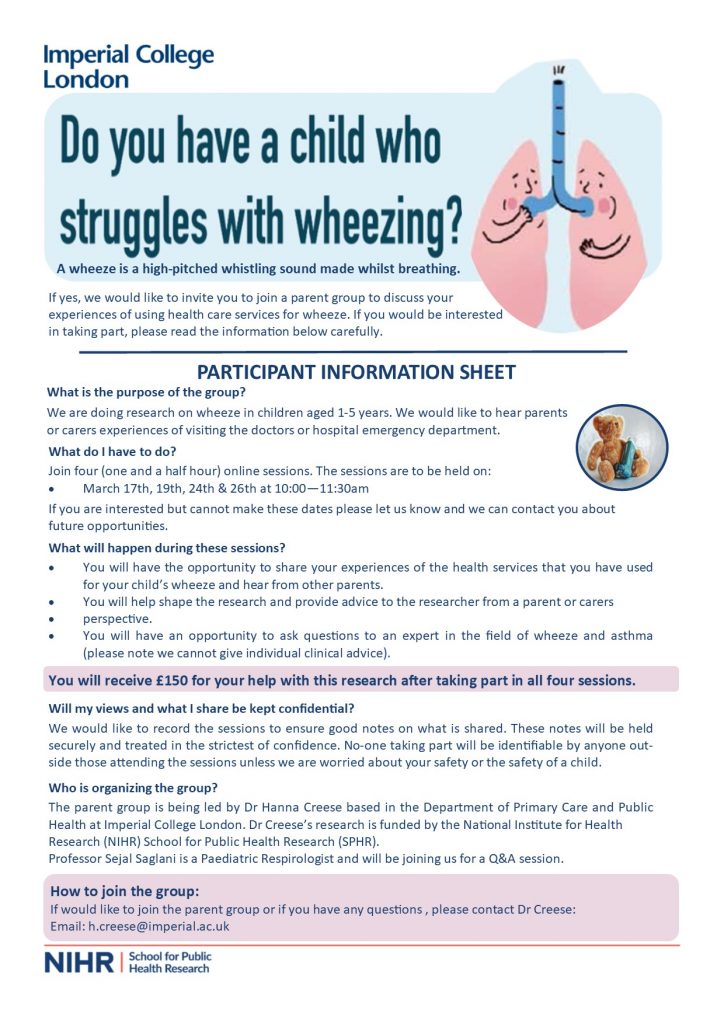- My Imperial Global Development Fellows Fund Placement at Imperial
- Researchers and community members working together to shape research on respiratory infections in young children
- HOPE for Hand Osteoarthritis
- Having an Impact with Public Involvement in Paediatric Intensive Care Research
- Public engagement and involvement at the Cardiomyopathy UK conference: When researchers and the public meet
In conversation with: Dr Hanna Creese, Postdoctoral Research Associate working within the Child Health Unit, Department of Primary Care and Public Health, Imperial College London

What is your research about?
Our research explores pre-school wheeze. A third of preschool-aged (1-5 years) children experience wheeze, making them cough and/or have breathing difficulties. The number of preschool children in the United Kingdom (UK) who suffer or die from wheeze attacks is higher compared to that in other European countries. Recurrent wheeze can last throughout childhood and be an indication that the child will develop asthma. Recurrent wheeze is influenced by genetic vulnerability, respiratory infections, and air quality, but can be prevented with timely healthcare after the first wheeze attack. Although studies have reported risk factors for acute asthma attacks in school-aged children, there are no reports of risk factors for recurrent wheeze in the preschool population. The pattern of symptoms in this age group is very different to school-aged children. Early identification and intervention when children present with preschool wheeze has the potential to reduce the risk of recurrence, readmission to hospital, and deaths.
In our research we aimed to investigate the role of preventive care and environmental exposures on recurrent wheeze in preschool-aged (1-5 years) children. To achieve this, we used anonymised patient data from a network of GP practices across the UK taken from the Clinical Practice Research Datalink.
While we had our own ideas, from a research perspective, of what questions we might like to explore using our dataset, we also wanted to ensure that our research was relevant and important to those affected by pre-school wheeze.
We therefore aimed to put together a parents group who would help inform our research and the questions which we would explore in our dataset. We specifically wanted to hear about parental experiences of healthcare for recurrent wheeze in preschool-aged children before & during the Covid-19 pandemic and environmental exposures.
Who did you involve and how did you find them?
We involved 12 parents of children aged 1-5 years with wheeze or asthma who were recruited from A&E, wheeze clinics & online support groups
The purpose of the parent group was to help shape analysis of recurrent wheeze in preschool-aged children in routine data. We wanted to hear about parental experiences of healthcare for recurrent wheeze in preschool-aged children before & during the Covid-19 pandemic and environmental exposures. Parents had the opportunity to share their experiences of the health services that they had used for children’s wheeze and hear from other parents.

How was the parent group involved in this research?
Parents had the opportunity to share their experiences of the health services that they had used for children’s wheeze and hear from other parents. Over four virtual sessions, our parent group discussed their children’s healthcare journeys, changes to healthcare during the Covid-19 pandemic, and experiences of environmental triggers for recurrent preschool wheeze. Small group discussions were facilitated through virtual break-out rooms and any additional thoughts were added by parents to IdeaBoardz, a team collaboration tool.
Outline of public involvement sessions held (below)
| Session | Content |
| Session 1: |
|
| Session 2: |
|
| Session 3: |
|
| Session 4: |
|
Did you provide any training to the parents invovled?
No formal training was provided, however during a Q & A session, parents were given an opportunity to ask questions to an expert in the field of wheeze and asthma, Professor Sejal Saglani. Parents reported coming away from the session feeling more empowered and knowledgeable about their child’s care.
Did you achieve what you set out to do?
For the final session, notes on discussions were synthesized and themes for analysis were presented to the group to reach a consensus on key areas of inquiry. Parents arrived at four main research themes. The first being the impact of preventative healthcare on rates of emergency admissions. Interestingly, this is something we had in our original protocol but had planned to analyse the impact of seeing a General Practitioner within 2 days after an initial wheeze attack. However, parents explained that this had never happened for any of their children. Instead, they were curious about the impact of having an asthma nurse, information and support following children’s initial attacks and the impact of being assigned to a respiratory consultant early in a child’s wheeze journey.
The second key area of inquiry for parents was the impact of the Covid-19 pandemic on changes in access to healthcare. Most parents described reduced rates of wheeze during the pandemic, having had a year off from other viral infections which would usually cause wheeze and a hospital admission. They were interested to know the long-term impacts of having a year of lung recovery and growth. There was understandably, also a lot of parental anxiety surrounding the return to school and the subsequent increases in viral-induced wheeze.
Discussion of environmental triggers mainly focused on the impacts of indoor and outdoor air quality on wheezing and rates of emergency admissions. The final key area of inquiry for parents was the impact of recurrent wheeze on other health outcomes including language, social, behavioural, and mental health. Parents spoke of very traumatic events when children were seriously ill, time spent in hospital and away from nursery or school and wanted to know how this would impact their children long-term.
What impact did the public involvement activity have on those involved?
We received positive feedback from parents, reporting the peer-to-peer support as being invaluable and the expert Q & A session as “unbelievably helpful”:
“[it was] … incredibly reassuring to hear us as a family are not the only ones going through this. The whole group was positive and came across as they wanted to help others…”
“[Q: what has been helpful or enjoyable about the group?] Meeting other parents who have gone through similar stressful journeys and feeling like I can help shape the care of young wheezers going forwards.”
What was the most challenging part of doing public involvement and how did you overcome it?
There were high levels of emotions, with parents sharing details of very traumatic experiences when children were seriously ill. We had planned for this and offered support to parents. As the group members were so sympathetic to one another, other parents supported each other by sharing similar stories.
“I really enjoyed being part of this group it was very informative and helpful. I would love to stay in touch with the lovely ladies who were part of this group and if anything from my experience can help others that would be great. Love to be part of follow-ups etc…”
What advice would you give other researchers interested in doing something like this?
Depending on the research area, participants potentially getting emotional must be considered and support provided when needed. We were lucky to recruit most of our parents through online support groups, meaning that we engaged with already well-informed parents all over the UK. However, this style of recruitment is not targeted at a specific demographic so would not be appropriate for different types of public involvement and engagement. Parents who are less confident or at different stages in their journey would also need more support and time so virtual sessions like ours will not work for everyone.
So, what’s next?
We plan to investigate the key areas of inquiry for parents in a nationally representative birth cohort of children in the Clinical Practice Research Datalink, examining the role of preventive care and environmental exposures on recurrent wheeze in preschool-aged children. We will stay in contact with our parents and hope to involve them again when the analysis is further along.
